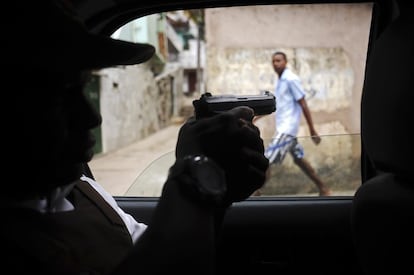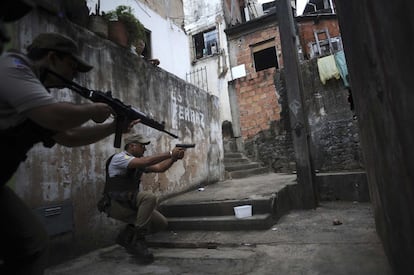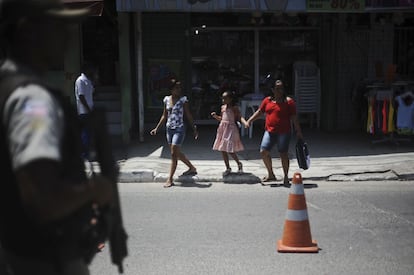The Gamboa case: The triple murder shining a light on police violence in Brazil
Three military police officers from Bahia are on trial for allegedly killing three young people in cold blood, planting weapons on them and altering the crime scene during the 2022 Carnival


The party for the 2022 Carnival ended with three young men shot dead by police in a poor fishing neighborhood in Salvador, which is one of the most photographed sights in the city due to its colorful houses. The first police version followed the typical pattern of the war on drugs: after an anonymous tip off about armed men, the agents entered the Gamboa neighborhood, the criminals resisted, shots were fired, and three young men were killed. Two years later, however, three military police officers are being prosecuted for the murder of the three locals and procedural fraud.
The Gamboa case is emblematic of the police violence in Brazil. The Prosecutor’s Office maintains that the agents killed the men in cold blood, planted weapons on them, manipulated the crime scene and threatened witnesses — a modus operandi that the family of victims of police violence have often denounced.
That night, Silvana dos Santos, 43, had one of her eight children taken from her. “They took them to an abandoned house. I went there and introduced myself as the mother of one of them, I didn’t say which one. My son was still alive. I know because I heard him. [The police] pointed a gun at my head. I screamed a lot, but I left. They were executed. If I had insisted, maybe I would be another victim and I wouldn’t be here telling the story,” she says between sobs. Her son Alexandre Santos dos Reis, 20, was one of the victims.
The radical turn of the case — known as the Gamboa massacre — is very unusual in Brazil, a country where more than 6,400 people — suspects and bystanders — died in police operations in 2022, according to the latest data from the Brazilian Public Security Forum. That means that 13% of violent deaths in the country are the work of uniformed officers.
A few months ago, the state of Bahia — where the capital is Salvador — took over Rio de Janeiro as the state with the highest rate of police violence. Officers are responsible for one in four violent deaths in Bahia. Across Brazil, the victims are almost always young Black men. The few cases of police violence that go to trial drag on for years and usually suffer from multiple setbacks that end in the acquittal of the police officers or light sentences. Just a few days ago, the Inter-American Court of Human Rights condemned Brazil for the Operation Castelinho in 2022, in which police killed 12 alleged members of the First Capital Command (PCC) on a bus in São Paulo. They fired more than 700 bullets. Over the years, the PCC has become the most powerful criminal group in Brazil. The U.S. recently sanctioned one of its money launderers.
In Salvador, the Gamboa neighborhood immediately mobilized after the deadly police raid. By dawn, they had blocked a major avenue. With traffic disrupted, the protest made the news. While the head of the military police shared the official version in a television interview, a group of women from Gamboa blocked cars and claimed that the police came into the neighborhood firing left and right. They demanded peace and justice.
Silvana dos Santos, the mother of one of the victims, was among the protesters. Holding the microphone tightly, she tearfully questioned the police version of the killing and praised her middle son. “He respected me, he treated me like a mother, he helped me,” she said in front of the TV cameras. “I trust more in my God, who is just and faithful, than in the justice of men,” she said. “The other mothers are afraid, I’m not. If I keep quiet, the next one could be another of my sons or my grandchildren.”
The police killed her son Alexandre, as well as Cleverson Guimarães Cruz, 22, and a minor, Patrick Sousa Sapucaia, 16. According to the indictment against the officers, on March 1, 2022, the three young men were celebrating Carnival in Gamboa when the police opened fire. Two were hit by gunfire and, along with a third, were taken by the officer to an abandoned house. Forensic evidence found that all three had been hit in the chest by shots from a submachine gun.
The indictment says the officers then cleaned up the blood (destroying the evidence in the process) “using a broom and a bucket of water” confiscated from a neighbor in order to “exonerate themselves of responsibility in the criminal proceedings.” In another move common to cases of police violence, the police pretended that the victims were alive and took them to hospital, where they were certified dead, according to the indictment.
The document adds that the officers planted a pistol and a revolver on the victims to support the claim that there had been a confrontation and argue they were acting in “legitimate self-defense.” The planted weapons were rusty and did not work properly. What’s more, tests indicated that none of the victims had traces of gunpowder on their hands.
Lawyer Wagner Moreira, 38 — a coordinator of Ideas Assessoria Popular, a civil society organization — joined the case to help the residents of Gamboa counter the police’s version of events, defend their rights and pressure authorities. During the first year, there was no progress, but the neighborhood did receive some intimidating visits from the police officers involved.
Moreira speaks of the courage of the families and neighbors. With that support, he and his team managed to get prosecutors specialized in public security to take on the Gamboa case and carry out an in-depth investigation. They performed technical tests and reconstructed the events. An internal affairs commission of the Military Police “came to the conclusion that there were strong indications that the victims were executed and that the weapons were planted on them,” said Moreira. But according to the coordinator, another commission from the same police force concluded that the officers had committed “no crime or irregularities.” In the end, the families’ version prevailed.

For this reason, three military police officers will sit in the dock for the murder of the three Gamboa residents. In addition, the agents, along with a fourth police officer who was driving the patrol, will be tried before a military court for manipulating the scene of the crime. The first hearing, scheduled for Wednesday of this week, has been postponed to May, according to Dos Santos.
The Prosecutor’s Office points that the triple murder was a consequence of the low value given to the lives of young Black people from favelas and impoverished areas. “It was committed for a nefarious motive, because the police assumed that all the victims were criminals and that they could react offensively to kill them given the devaluation of their lives, even without any armed reaction or resistance.”
Police violence in Brazil is blind to politics. The state of Rio de Janeiro, which held the record for police killings, has been governed for years by politicians allied with Brazil’s far-right former president Jair Bolsonaro. While in Bahia, the Workers’ Party of President Luiz Inácio Lula da Silva has governed for 16 years. Moreira maintains that “the left’s premise that, by reducing poverty and improving income distribution, violence would fall has proven to be unsuccessful.” He criticizes state authorities’ “denialism of the data” and their failure to commit to an alternative public security policy.
Moreira adds that taking the police officers to court “is a victory for the first battle, but nothing ensures that they will be held accountable.” He recalls another emblematic case from Salvador: the Cabula massacre, when 12 Black men were killed by police. The case has been reopened after nine years, a summary acquittal and a trial annulment. Moreira criticizes the fact that the Military Police of Bahia invests a fortune in facial recognition — the star public security measure at this year’s Carnival festivities — but not in police body cameras, which are cheaper and have proven effective in other parts of Brazil.

Sign up for our weekly newsletter to get more English-language news coverage from EL PAÍS USA Edition
Tu suscripción se está usando en otro dispositivo
¿Quieres añadir otro usuario a tu suscripción?
Si continúas leyendo en este dispositivo, no se podrá leer en el otro.
FlechaTu suscripción se está usando en otro dispositivo y solo puedes acceder a EL PAÍS desde un dispositivo a la vez.
Si quieres compartir tu cuenta, cambia tu suscripción a la modalidad Premium, así podrás añadir otro usuario. Cada uno accederá con su propia cuenta de email, lo que os permitirá personalizar vuestra experiencia en EL PAÍS.
¿Tienes una suscripción de empresa? Accede aquí para contratar más cuentas.
En el caso de no saber quién está usando tu cuenta, te recomendamos cambiar tu contraseña aquí.
Si decides continuar compartiendo tu cuenta, este mensaje se mostrará en tu dispositivo y en el de la otra persona que está usando tu cuenta de forma indefinida, afectando a tu experiencia de lectura. Puedes consultar aquí los términos y condiciones de la suscripción digital.








































